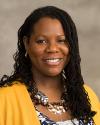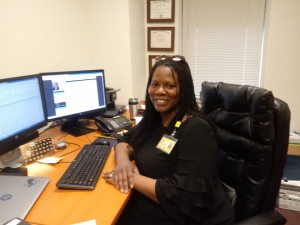A nursing innovation to connect caregivers
Assistant Professor Sheria Robinson-Lane, Ph.D., RN, is a nurse, educator, gerontologist and internationally recognized expert on care for older adults with cognitive disabilities. She is not a software developer. But that’s a new world she’s found herself in as she works to create a smartphone application that can improve the lives of dementia caregivers.
Robinson-Lane’s community connections and personal experience during pregnancy inspired her to explore the idea for a technological intervention that’s rife with possibilities. Discussions with community partners on issues of older adult care and support for families affected by Alzheimer’s disease reinforced a detrimental impact on caregivers.
“One of the recurring themes is how socially isolating it is,” she said. “People often go through this journey alone, and it’s an intergenerational journey. It's hard to get reliable information, to connect with people about what you’re going through and find access to helpful resources.”
When she was an expectant mother, Robinson-Lane appreciated the simplicity of finding support through a smartphone application.
“It was so useful to have an app to help me understand what to expect, how to deal with challenges and find support along the way. I realized there are so many apps for pregnant women, but there's nothing like that for caregivers,” she explained.

Informing an idea
Equipped with a promising idea, Robinson-Lane relied on existing relationships to assess its potential. She formed a community advisory board to gather input from a range of resources, including the Institute for Population Health, Friends of Parkside and Latino Family Services programs in Detroit, Michigan Alzheimer’s Disease Research Center, Michigan Dementia Coalition, and the U-M Center for Disability Health and Wellness.
While she listened to frustrated families struggling to find support, Robinson-Lane also reflected on the challenges her mother faced as a caregiver.
“Both my maternal and paternal grandmothers died of dementia. Watching my mom function as power of attorney and being in that space of caregiving, I know how incredibly anxious, lonely and financially stressful it can be,” she said.
 Building a framework
Building a framework
With guidance from the advisory board, Robinson-Lane was able to define the key components necessary to bring a useful intervention into caregivers’ hands.
An education section will provide users with information on different types of dementia, including symptoms and diagnostic descriptions, timelines to track the evolution of a disease and tips on how to manage certain behaviors. This section will also include strategies for self-care, providing caregivers with tools to monitor and prioritize their own health needs.
A resource section will use GPS to connect individuals with services in their own communities, such as agencies on aging, health care providers and other support-centered organizations.
One of the most important features, Robinson-Lane explained, will be a chat function, allowing caregivers to connect in group forums or through private messages to discuss specific topics, address mutual concerns or share experiences.
While dementia care is driving the application’s development, Robinson-Lane realizes its growth potential.
“It’s important to me that this has the capacity to grow, because when I think about dementia care, I think it falls under the larger domain of mental health care, and that's an area that's severely lacking,” she explained. “This app starts with dementia, but I hope it can move into other spaces for people to find mental health support for themselves or others.”
From concept to creation
To help bring her idea to life, Robinson-Lane connected with the U-M School of Nursing's Healthcare Innovation Impact Program (HiiP), a newly developed suite of innovation support and engagement services led by Associate Professor Olga Yakusheva, Ph.D. that helps nurses and other health professionals capitalize on the potential of their ideas and bring them into the marketplace.
Over the summer, HiiP facilitated a connection that will be critical to the app’s creation. Through the U-M Office of Technology Transfer’s free Digital Discovery Process, Robinson-Lane worked with a team of software professionals and industry experts to move her early-stage software idea into a well-developed concept. The process equipped her with a “Digital Discovery Workbook,” complete with a value proposition, use cases, basic user experience wireframes to illustrate what the app could look like on screen, as well as technical footprint requirements, an initial compliance and security assessment, and a clickable comparison demonstration to use when presenting the idea to developers and investors.
“Having the HiiP team available to facilitate this and move things along has been instrumental, because we certainly would not be where we are right now without them,” Robinson-Lane said. “I'm trying to teach, conduct research and do so many other things. If they weren’t there to push this forward, there's no way we could have gotten this far.”
 “It has been incredibly rewarding to work with Sheria as she develops her app. Every step of the way, you can envision the end product and how many lives it is going to touch,” Yakusheva said. “Whether it is helping refine an idea, market discovery, prototyping or execution, HiiP is here to help nurse innovators make a positive impact.”
“It has been incredibly rewarding to work with Sheria as she develops her app. Every step of the way, you can envision the end product and how many lives it is going to touch,” Yakusheva said. “Whether it is helping refine an idea, market discovery, prototyping or execution, HiiP is here to help nurse innovators make a positive impact.”
With a litany of new resources, Robinson-Lane has returned to her community stakeholders to gather more feedback and gauge initial reactions. She’s working to refine the concept and include new and previously unconsidered features such as additional language capabilities and filters based on a caregiver’s specific needs.
“Now we're in a space where we have started talks with development groups to get an idea of pricing and timelines,” she said. “We’re starting to put more formative funding proposals together to move this along, and I think we’re going to get some interest — I really believe in this idea.”
A natural nursing innovation
Robinson-Lane’s journey through this process is further illustration of nurses' innate innovative potential. She has focused her career on supporting patients with dementia and the caregivers they depend on; the innovation naturally evolved.
“At the end of the day, when the doctors go home and everybody leaves except the custodians and cleaning staff, all you have left are the nurses,” Robinson-Lane said. “We figure out how to get it done. Sometimes we get in trouble for that — we call them ‘workarounds’ — but those are really innovations.
“We have the ability to problem solve and pull together our broad base of knowledge to help people, families and communities optimize their health. And I think nurses need more spaces to encourage them to bring these fantastic ideas and ‘workarounds’ to the table.”
Make a gift to support innovation at the U-M School of Nursing.





